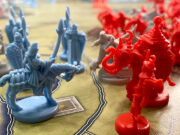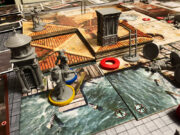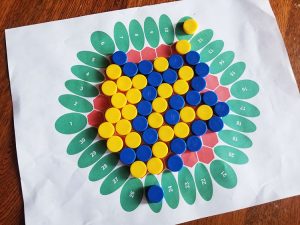 Print and Play games have been in high demand this year. There are endless amounts of solitaire games available to print (the majority for free), such as 1972: The Lost Phantom. Not only are there many solo games to print, but abstract strategy games get many of their starts as Print and Plays.
Print and Play games have been in high demand this year. There are endless amounts of solitaire games available to print (the majority for free), such as 1972: The Lost Phantom. Not only are there many solo games to print, but abstract strategy games get many of their starts as Print and Plays.
Today I want to give light to a printable abstract from the mind of Nick Bentley, who is most known today for designing 2020’s hit card game Oceans. Bentley is also known as an award-winning designer for his abstract strategy games, such as Circle of Life, Bugs, Blooms, and the focus of today’s review, Catchup.
Gameplay Overview:
Nick Bentley is known for his simple rules, and Catchup is no different. The board for Catchup is a hex grid with a green score track around the hexes. Two players will alternate back and forth placing stones pulled from any abstract game on your shelf like Go or (in my case) Volo.
In Catchup, sets of connected stones are called groups, including a single stone. The score track around the board keeps track of both player’s largest group, and in the end, the player with the largest group is the winner.
On a turn, a player may add one or two pieces anywhere on the board. If their largest group grows, then their score on the track reflects the change. If they tie or take the lead after scoring, then their opponent may place one, two, or three pieces.
Catchup ends once all hexes are filled with a piece. Whichever side has the largest group (aka the highest score), is the winner. If there is a tie, then both players move to their second largest group, and whichever is biggest is the winner. This process continues until there is not a tied group size.
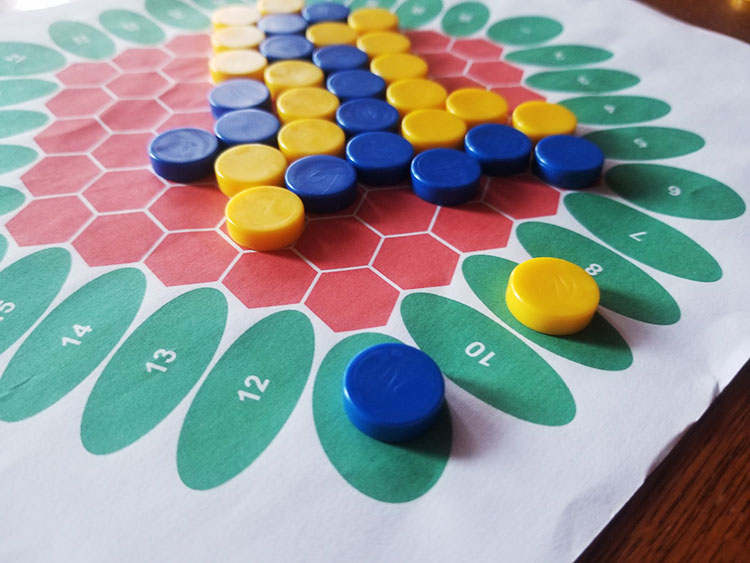
Game Experience:
It must be said upfront: Catchup is free to play. The game board is available to print, and if you would prefer to play online, it is available through littlegolem.net and even an app for IOS. Even if you are not in possession of go stones or several abstract pieces, the game can be played using cubes that one can steal from any game on their shelf.
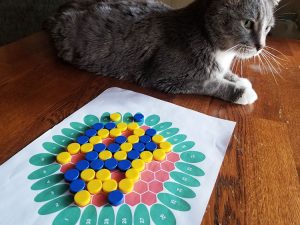
Catchup is one of those games that does a lot with a little. There are only four rules to teach, and two important concepts (groups and score). It’s one of those games that you can teach, and by the time you’ve taught the game, your opponent looks at you and asks, “is that it?” On the surface, there doesn’t seem to be a lot to it, and with limited plays, players may think that to be true.
But the game opens up with experience, like all great abstracts do. Catchup’s key mechanic that differentiates it from all abstracts is its namesake: adding three pieces if the opposition raised their score and took the lead or tied it. This one rule creates tension and decisions that are missing in many games, mostly centered around timing. When is the right time to score? Much of the beginning of a game is placing two pieces, but never connecting any of them so that the opponent cannot gain the piece advantage. But each time two are placed, you are evaluating your opponent’s board state, their strengths and weaknesses, your strengths and weaknesses, and if combining your pieces into the first large group will be the right or wrong time to strike.
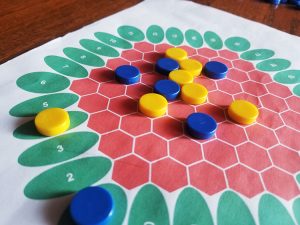
Once that first group is made, the tough decisions do not fade to the background. What does change is the question. It’s no longer when, but how. How does one use the extra stone? Should it be used to further score the biggest group? Should those stones take the lead and give the opponent an opportunity to use three pieces? Bentley has also ensured that there is no way for a game to end in a tie. The board has an odd number of spaces, and when scores are tied once the board is filled, the next highest group becomes the scoring group, and if tied, it continues until there is no longer a tying group.
Each game will finish in almost no time, with the BGG listing having the playtime as 13 minutes (an oddly specific time). Setup and tear down is essentially nothing, either laying out the board or clearing the pieces. About the only downside is that a player must provide their own pieces, which isn’t a huge deal but still a bit of an inconvenience.
Final Thoughts:
After Andrew and I combined to make our Top 10 Abstract Strategy Games, I’ve almost exclusively played abstracts, exploring ones that I’ve never played. Catchup is one that if I had played it before publishing my list, it would for certain have been included. It would be in the Top 3, possibly No. 1. It’s just that good with so little rules. Every used piece offers a question of scoring, timing, offense, defense, and executing plans for the future. This is one of those games that should be in every collection on the principal alone that it is free to print. But even if it was for sale in a $20-$30 boxed version, it would still be worth the money.
Final Score: 4.5 Stars – A top tier abstract with easy rules, low playtime, complex interactions, and a nonexistent price.
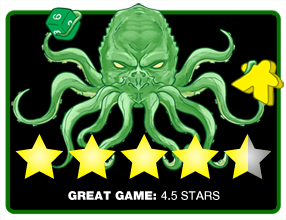 Hits:
Hits:
• Free to play and own
• Simple rules
• Difficult decisions
• Quick gameplay
• No ties possible
Misses:
• Requires pieces from other games to play




